#we spent hours talking about their designs and they drew everything the way i visualized it
Text
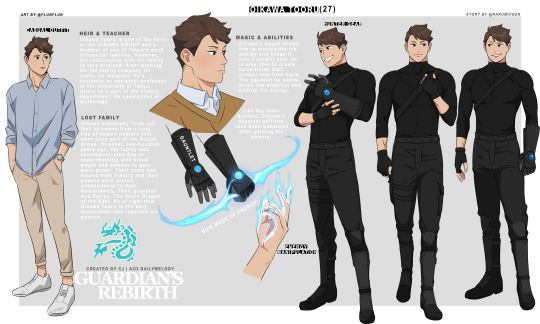
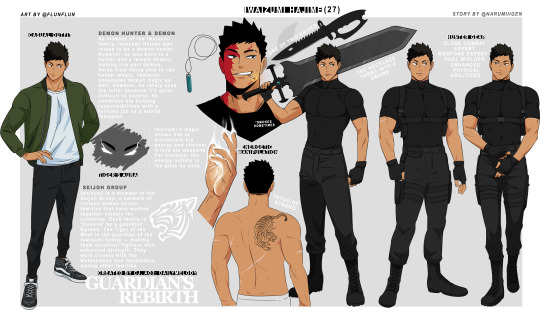
oikawa and iwaizumi's ref sheets for my fic guardian's rebirth.
drawn by @flunflun
#oikawa tooru#iwaizumi hajime#iwaoi#iwaoi fic#haikyuu#GR#my writing#they LOOK SO GOOD#tora did such a wonderful job drawing them#it was so much fun putting the ref sheets together#i cant believe theyre finally here omg#we spent hours talking about their designs and they drew everything the way i visualized it#JUST PERFECT
677 notes
·
View notes
Text
Ishida Sui’s Review of 2019
I didn’t think I’d ever finish this with my onslaught of classes including pharmacology, but I somehow managed! 6k word count, the longest TL I’ve done to date besides Parvati’s interlude for FGO. Lots of insight into Jack Jeanne’s production and what Ishida’s been up to for the past year. It was tough to translate because it was so long, but I had a lot of fun.
Let me know if there are any mistakes, I’m sure there’s a whole bunch. Have fun reading!
Original can be found here.
***
2019.
I’m reflecting on this past year while flipping through my agenda.
Since I’m writing this for my sake, there’s going to be a lot of sections without much explanation.
January
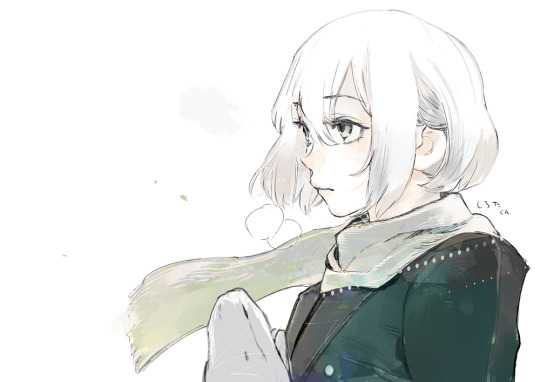
○ This was when Jack Jeanne had yet to be announced, so I was mostly doing preliminary work at the time.
Stuff like “BU” and “character facial expressions” will be finished some time this month, is written in my schedule book.
○ New Year’s party in Tokyo from the 16th - 19th.
The New Year’s party is a joint party that’s comprised of the 4th editorial department (Shueisha’s seinen magazine branch) that’s held every year in January.
I attended the party with the staff every year during serialization, minus my first year.
2019 will be the first New Year’s party since the series ended, but I thought I should stop inviting the staff to attend since we’re not working together anymore (plus it’d be a hassle), so I didn’t really invite anyone.
But the day before the event, Editor M brought up the topic inside the taxi and asked, “Are none of the staff coming this year?”
(Even if they’re invited now, it’s going to be impossible, asking them to fly the next day and causing a ruckus…)
When I replied, “Hey, I’m sure it’d be fun if you invited them and they all came~”, the editor contacted Goubaru-kun, and after said, “He said he’s going.” Guess he wasn’t busy.
In the end, the staff during serialization and several people from OB and OG came, almost identical to the lineup from previous years, and it occurred to me that maybe I should have just invited them from the start.
Anyway, at this year’s New Year’s party, I don’t really remember much of what happened.
I talked with my senpais from back when I was an assistant for Kingdom, and outside the venue I sobered up from the agoraphobic dizziness I was feeling inside.
At the second party I remember people talking to me haphazardly and being photographed.
I wish I’d refused.
Also, I was sexually harassed by Rikudou Matsubara, my senpai from the same region as me.
This New Year’s party will be my last.
February

Briefing session for the game held in Tokyo. Key visual created.
It says here [on the agenda] that I want to go to Kagoshima.
Every week there’s a checklist for 10 km of jogging and weight training 2-3 times a week.
I spent about a week doing some composition work.
It ended up being helpful for me, but it made me decide not to work anymore with people with different levels of interest from me.
○ TRPG is written for the 28th. Usually we use the DX (Double Cross) system, but this time one of our participating players, M’s schedule was under mysterious attack.
As game master, taking consideration of everyone who’d made time in their schedules for tonight, I thought we could switch to Cthulhu and asked them to wait an hour. 2 hours later I finished coming up with a scenario and began the session. It was fairly fun.
March
Finish BU this month, is clearly noted down.
BU stands for bust-up, which are drawings of characters in standing poses [sprites] that are common in ADV games.
Normally, since it takes a huge amount of work, the BU work is always divided up.
The original drawings are done by the illustrator, in this case I do the base illustrations (line drawing & colouring), and using them as the base, the department sharing the work cleans up the line drawings and recolours it...that’s how the process goes.
But since I’m a mangaka and don’t have the technology needed to make gaming assets, I thought it’d be best to leave it to the pros in that field, so that was how that stage proceeded.
At that point in time at least.
I also had plans written down to go to Kagoshima. Looks like I didn’t go.
○ TRPG on the 25th. Player M’s schedule lined up with ours, so we played DX with 6 PL plus me as GM. We went to the aquarium, were attacked by witches, and so on.
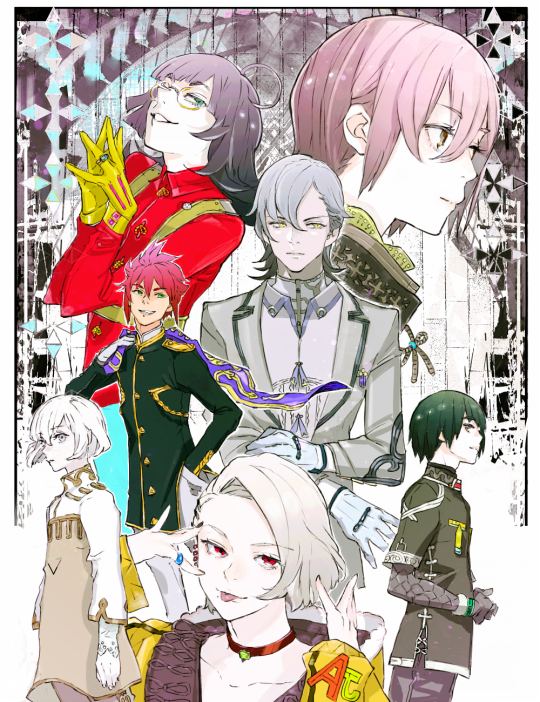
April
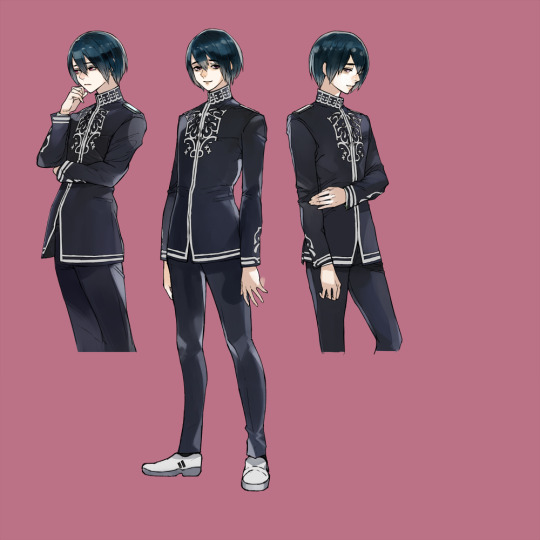
Finish BU, is faintly written down.
It seems like the work was more or less completed earlier this month.
○ High school friend K’s wedding on the 6th.
Up until then I’d only been to two other wedding receptions.
The weddings were for a different friend from high school, and Tajika-san, one of my senpais from Kingdom.
This suddenly reminds me of that time at Tajika-san’s reception, when I took a super early flight because I absolutely didn’t want to be late whatsoever, but I ended up not being able to fly for about an hour and a half because of engine trouble or whatever, so I entered at almost the same time as the bride and groom during the reception…
K’s wedding was the first time in my life where I was present all the way from the wedding to the reception, but how should I put it, I was struck by a beam of light.
I don’t know who he’s getting married to, I have no clue what their relationship is like. But I was somehow bombarded...by all these thoughts that became jumbled in my head, like the energy in this place, the power of their oaths, questioning what it was, how light isn’t always justice.
I got the feeling that this was what proper, respectable humans take part in, but since I'm fine with not being a proper, respectable human, I decided to not do anything other than what my heart desires.
I'm definitely not good with places where I’m in the spotlight. But congratulations.
○ “Play Sekiro” is strongly noted down.
Thank you for supporting me in the first half of 2019.
○ TRPG for the 29th - 30th. DX.
Player M’s character dies.
May - June
My schedule book is starting to look more scattered now.
On the other hand, since I’ve got a good memory of this time, I can write while recalling the events.
○ I did the covers for the Touken stage play book.
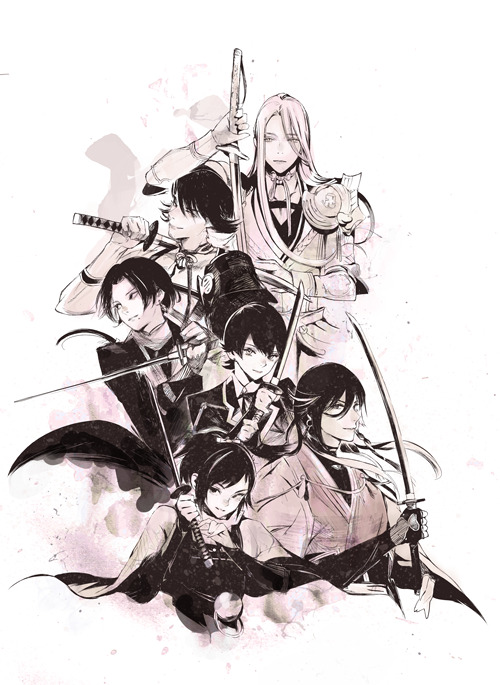
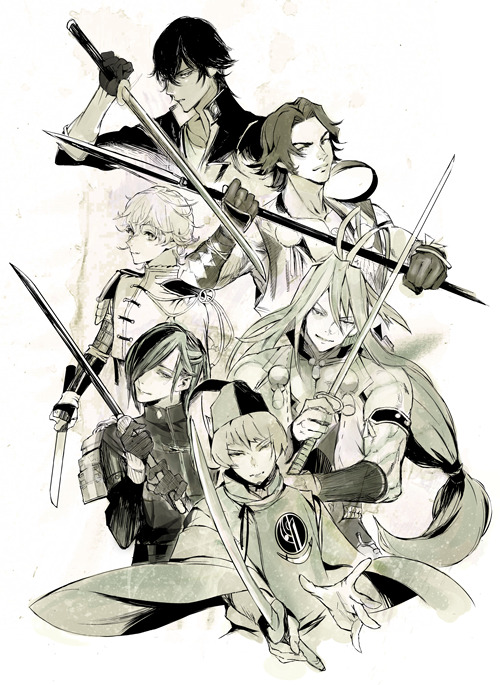
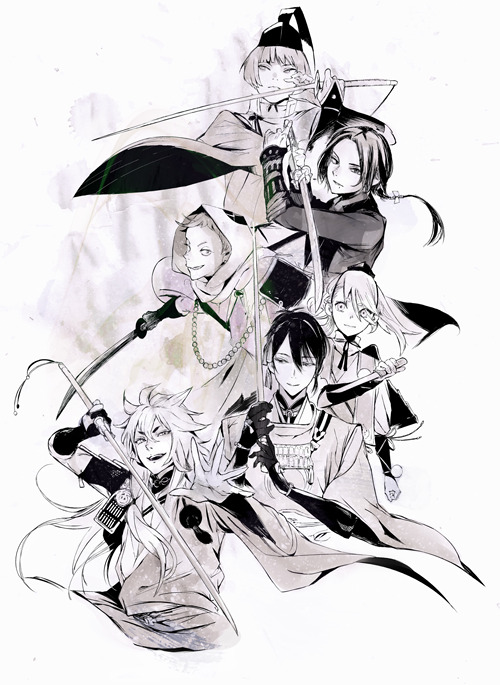
I drew the cover illustrations for the Touken [Ranbu] stage play that Mikasano-san, who I’m grateful to for his work on the anime and movie scripts for TG, worked on.
In my mind, it feels like I'm watching the back of who I'd consider my older brother in the creative world, or a fellow comrade on another battlefield fighting to the death.
I think it came out quite charmingly, so I’ll include the links for now.
Link 1 | Link 2 | Link 3
During this time of work for Jack Jeanne, I was working on “model sheets”.
Blueprints for the characters’ attire, not just from the front but also the internal structure.

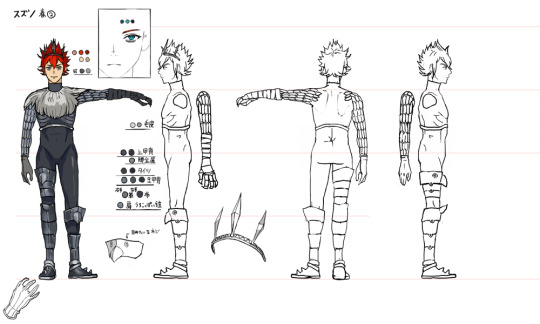
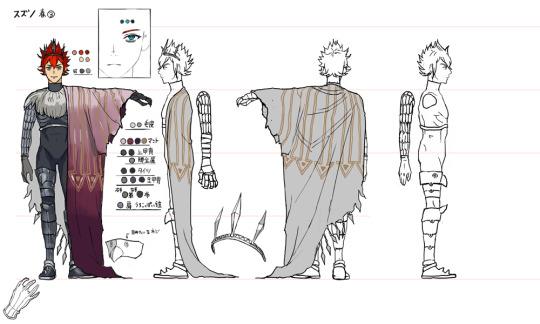
Unlike most other games, Jack Jeanne has “performance costumes” in addition to normal attire.
Because of its “revue” theme, costumes that will be worn onstage needed to be prepared.
I was shocked when I suddenly admitted that I needed model sheets for 5 different performances (spring, summer, fall, winter, final) for the 6 main characters, making 30 designs in total.
Back in the TG era, these kind of drawings that I just explained, or drawings that needed a lot of layers, were a pain in the ass. Plus I wasn’t good at them, so I thought that I didn’t want to do it for the rest of my life if possible.
But it seems like I have to do this myself.
With a sense of determination, I decided to work solely on this for all of May.
At the same time, I made nothing but curry for all my meals.
There’s no deep reason behind it, but my aim was to kinda boost my ability to concentrate daily by choosing to be decisive in that action.
○ Working on model sheets
It came with an unintended effect. Because I spent a month on work that required balance and consistency, my right-left checking skills got better, and completely unrelated, I improved in drawing perfect copies.
The design work for the model sheets itself became really fun to do, starting around when I became obsessed with the scarf design (sumo wrestler drawing) I definitely couldn’t use for Neji’s summer costume.
I discovered that it’s precisely because I’m not good at this that my labour bore fruit. I feel like this was my experience for the latter half of the year.
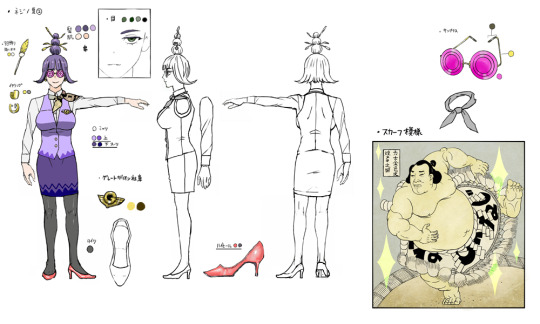
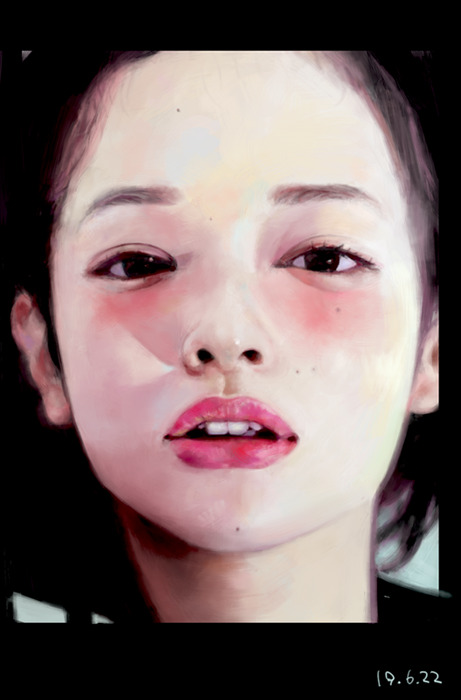
July
The cast members were chosen.
Unlike TG, there are 6 people + 1 person who can be referred to as the main character, so it was interesting to have a cast with some breadth.
Seems like lyrical work was the main thing I worked on.
Lyrical work.
In Jack Jeanne, each performance contains several songs to sing and dance to, so each one is supposed to be sung.
...hence the lyrics.
The topic of what to do with the lyrics was brought up in November 2018.
What happens typically is that, let’s say there’s singing in an idol game, then a company that specializes in it is asked to produce the songs.
Even for Jack Jeanne, there were several candidates I could pick and choose from.
But after a quick look-through, frankly speaking, they all looked the same to me.
There’s one person that’s good, it’d be great if we could get them...is what I thought, but, “Even though I don’t have the skills, I’m the one who understands this world the best,” crossed my mind.
...should I try?
I tried it.
To be honest, I was super embarrassed since it’d be seen by a lot of people, but it evolved into, “Who cares if you’re doing it?”
And so Jack Jeanne’s lyrics were tasked to me.
I mentioned this earlier, but there are multiple songs for each performance.
So if you combine those plus the opening and ending songs, that makes 17 songs in total. Lyrics for 17 songs that I’m fully responsible for.
What the hell...am I doing?
Maybe it was from that moment that I started losing it.
Including the lyrics that I’d been working on bit by bit every month, the remaining ones were finished in one go this July.
By the time I finished everything, my current state was, “Give me more songs...let me write more lyrics!”
But it wasn’t over just yet.
August
Every time I meet someone I tell this story. I’m thinking of keeping it up.
Here I am, relieved to have finished the lyrics, when a message pops up on the Skype group chat.
It’s from Yamashita Daisuke of Broccoli.
To briefly touch upon Yamashita Daisuke, he is a young man who’s been involved with this project since October of 2018, and a poor soul who was tasked with conducting very important meetings on his third day of working at the company.
The producer from Broccoli was going on maternity leave, so he was scouted as her replacement.
As an aside, if I have to be honest, the exchanges between me and Towada-san, and Broccoli’s Jack Jeanne team up until then were quite frustrating.
“How about doing it like this?” they would counter.
And we’d respond with something like, “This part is going to be developed later on, and since this will become foreshadowing for the entirety of the story, it can’t be modified that easily.”
This kind of situation, having to explain everything in detail one by one, going 3 steps forward and being held 2 steps back, had been going on for about 3 years, so the two of us would often whine about it over drinks, going, “When should we quit, this is ridiculous,” etc.
Finally when things began going more smoothly, the producer who was leading the project took her leave, so I wondered if we’d be able to get along with Yamashita Daisuke, but he was, how should I put it, very diligent.
For the last year I've been working with people who don’t put in their best effort, so I was very hopeful and thankful to him.
But I digress.
This was the gist of the message that Daisuke sent.
“Kosemura-san’s who’s in charge of musical composition wants ‘scratch vocal tracks’ for when the singers are recording.”
“Does Ishida-sensei happen to know anyone he could ask for this favour?”
“I’m sure it won’t be a problem for you!”
“Frankly speaking, it’s okay even if they’re bad.”
Huh.
Well, as you might have already guessed, even with the lyrics, it’s impossible to really understand the song at first sight without knowing what kind of rhythm, what kind of emotions are being expressed in the bar measure.
Of course we’d need ‘scratch vocal tracks’ to explain the general feeling of the song.
Now, what Daisuke said was, “Do you have anyone you can ask? It’s okay even if they’re bad. Or even you can do it.”
But if I found a “it’s okay even if they’re bad” kind of person, we’d still have to show them how to sing it and explain how the rhythm goes.
Daisuke already knew which was probably why he asked for the favour.
“The person writing the lyrics would be able to make the scratch vocal tracks the fastest.”
...come to think of it, the demo songs that Kunimitsu sent me every time that were sung using Vocaloid, weren’t they also scratch vocal tracks?
Daisuke must have been in a pinch trying to figure out how he should ask me candidly.
Ishida-sensei, I couldn’t just ask you to sing it, so I had to ask in a roundabout manner.
I’d already given my answer, but I was still hesitant.
It’s true that after I finished writing the lyrics for the 17 songs I’d already lost sight of myself, but if I sang, my singing would reach Broccoli and Kosemura-san’s team’s ears.
But I couldn’t just leave poor Daisuke hanging.
So I consult Towada-shi, whom I’d been collaborating with in creating the scripts for Jack Jeanne, for advice.
(He had been in charge of TG’s novels, and I’ve known him for a long time.)
“Did you check Skype?”
“I did.”
“What do you think?”
“Start by looking up scratch vocal tracks,” so we paid a visit to YouTube. The first search result that came up for ‘scratch vocal track’ was a video of a vocalist who was used to sing a scratch track for AKB or something.
I see, so that’s what it looks like. Innocuous, but I could see it was very professionally done.
And the second result that came up was Tsunku♂-shi.
The figure of Tsunku♂-shi himself recording a scratch track for his idols.
The producer himself became an idol, and was singing really cutely, in his emotions and how he sang it.
“This is it?” I said.
“Yeah, it is,” Towada-shi agreed.
If Kosemura-san and his team, and the people who will be performing the songs have to listen to it, it’d be a disservice to them to half-ass it.
I don’t like people who don’t try their best. That means I have to show that attitude myself.
Let’s come out of my shell for poor Daisuke as well.
“You’re gonna become Tsunku♂.”
“Yeah...I’m gonna be Tsunku♂!”
And that was how I became Tsunku♂.
I replied to Daisuke on the Skype group chat.
“Understood, I’ll do what I can.”
So this guy, who doesn’t even know what the ‘D’ in DTM stands for, first downloads the software, and begins setting up a recording environment. Other work is pushed aside. I set 3 days to work on this.
I timidly begin working on the scratch tracks.
From the perspective of someone who doesn’t have to listen to their singing for a living, it starts out as a living hell, but you get used to it as you listen to it over and over.
And so I kept learning new things.
I noticed I was harmonizing with myself.
Just like Tsunku♂-shi, I’d change the voice for each character.
If it was Jack (male in a male role) I’d sing like a man, and if it was Jeanne (male in a female role), then like a woman, while the main character Kisa (female) should sound cute...
No, Kisa needs to be cuter! I re-recorded her part many times.
Depending on the song, I’d sing for 7 people.
I was Jack Jeanne now.
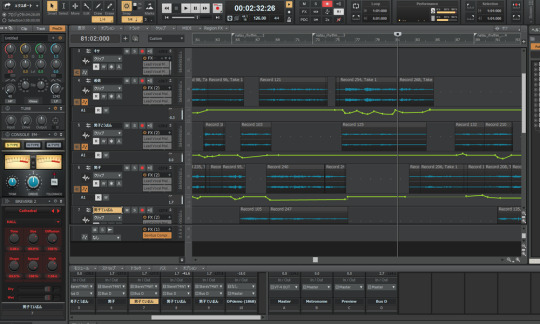
Tsunku♂ (I) recorded 17 songs in 3 days, and sent the data first to Towada-shi.
Since I was now Tsunku♂, I no longer felt any sense of embarrassment.
“I listened to it,” the reply came, and I called him.
Towada-shi was roaring with laughter.
I regained the embarrassment I’d forgotten.
“Oh no, I was laughing ‘cause I was impressed,” he said, but my heart was already as fragile as that of an abandoned dog.
“Even this is a big help to Kosemura-san, and Daisuke should be grateful, right?”
Yeah. Although Towada-shi guffawed at me, Daisuke will surely thank me.
And then he’ll definitely tell me what a good job I did!
I dumped the music into the Skype group chat.
“I did what I could,” I added.
How will Daisuke react to my Tsunku♂?
I waited restlessly.
Three days later on August 5th, a formal message arrived after it was received.
“Thank you very much. We will schedule a meeting with Kosemura-san…”
I couldn’t believe my eyes.
My hard work got dismissed with, “Thank you very much.”
Daisuke, why?
I thought you were in a pinch, so I...were...were you fooling with me from the start? Answer me! Daisuke!
Just tell me I did a good job, or follow up with something, I’m fine with anything!
So much for my heart being like an abandoned dog, it’s more like a grown-ass man left naked on a snowy mountain.
I did what I could! This feeling was welling up inside me, but was it myself that managed to do it?
○ Later, at a meeting with Kosemura-san
“It’s great that you could do this much for us. You didn’t have to do all that.”
With the gist of those words, a warm blanket was finally placed over my heart, which had almost frozen to death.
“I didn’t know how to respond. I wasn’t sure if Sensei was the most who did it in the first place,” Daisuke said, so I decided to satisfy myself by threatening, “I’m gonna tell this story until the day I die.”
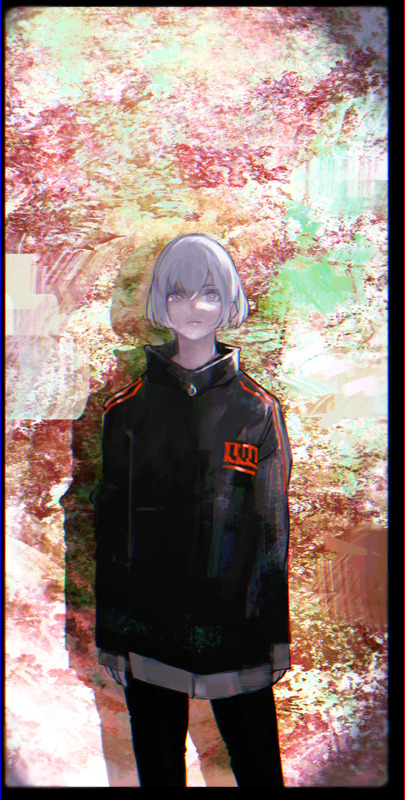
September
○ Responses to the Questions to Ishida Sui contest
We did a “Ask anything to Ishida Sui” contest as a project for the art book “zakki:re”, where purchasers could apply with a postcard.
I was writing the replies for them.
I thought there’d be a lot more questions about TG or its contents, but surprisingly there were a lot of questions asking for life advice.
There were quite a few questions that I had to seriously think about to answer.
It was kinda tough since there were over a hundred of them, but I thought it’d be nice to get in touch like this every once in a while.
○ BU work for Jack Jeanne
Once the music-related tasks like lyrical composition and scratch vocal tracks were completed, I worked on BU.
...BU work? Wasn’t it finished back in April?
Well, a similar situation arose just like what happened with the lyrics.
Regarding sprite quality I might not be able to beat the pros, but since I’m the one who best understands how the characters look best and their body balance, I had decided to do all the line drawing colouring myself in June.
I had no clue whether I’d make the deadline or maintain the quality, but thanks to Broccoli’s understanding, I was allowed to make it myself.
I realized once again that I’m terrible at splitting up work.
If I can do it by myself, I will.
Plus, it’s, how should I put it, starting from my TG days, even though it wasn’t a lot I got to see various types of workplaces.
I’d see places where there was no sense of responsibility whatsoever, or the work may have been divvied up appropriately, but it felt like they were making something without a sense of purpose, like a main plot line that isn’t going anywhere.
It’s impossible to accomplish big things with that kind of stance, and I understand that the more people that intervene, the more uncertain the core becomes, so I didn’t like that kind of approach.
It makes me wonder whether there’s any meaning in creating a work that’s conservative and unchallenged, and if it’s nothing more than a money grab.
Since I don’t have any desire for material things, getting fed up about it is useless, but I just can’t help thinking about it.
Of course, it may be difficult to get what I want 100% of the time, but I want to create things in an environment that I think is beautiful, even in places that I’m slightly involved in.
...in other words, BU work is tough, but I began remaking the sprites once again by myself.
This was the toughest work I’ve ever done out of everything, including the serialization...
○ Scratch vocals training camp at the end of September
I went to the recording for the scratch vocal tracks.
Based on the scratch tracks that I made, we got professional vocalists to sing it again properly.
This is what the actual cast would use as a reference to sing.
(So my version was like the pre-scratch vocal track.)
I was stuck in Tokyo for almost a week.
Wake up, get ready, go to the recording studio.
Come back at 8 or 9 pm, rest and sleep, repeat.
It was like I was back in school, and since I don’t have a steady lifestyle, I enjoyed it.
Kosemura-san’s team is really great, and I know I mentioned this before, but I felt like their workplace was a very healthy production site.
When I was drawing manga, I never had much time to talk with fellow manga artists, and I’ve never had the chance to experience what other professionals’ workplaces were like, so it was very exciting for me to see people as professionals tackle one thing seriously.
The vocalists were as amazing as I expected, and although my scratch tracks were played at a loud volume to annoy me, I had a great time.
The game might have a high level of entry, but it’s worth listening to just for the songs, is what I truly thought.
○ Parting words to Editor M-shi
This might have been back in August, but from 2018 to 2019 I had a lot of things on my mind, so I began talking to the editor.
In between the 11 years of serialization starting from my rookie days, I’d received guidance from him so it wasn’t easy, but I expressed to him that we should keep our distance for any future works.
“I want to become absorbed in myself, not to Ishida Sui or Tokyo Ghoul,” I told him.
The other part said he also felt the same way, and accepted it.
The next time we meet, I hope we can talk about what we’re into, what we’re going crazy over, he said.
And so, 2 months after that conversation was the scratch vocals training camp in Tokyo, and I had the chance for the two of us to talk again.
That day I was completely tuckered out from recording the scratch track, but it was a day filled with accomplishments.
He took me to a restaurant with delicious food in Ebisu or somewhere, and after concluding our brief business meeting, I tried throwing out the cliched, “So, what are you up to lately?”
As the lead writer, there was a part of me that was curious about how he was doing after that talk we had.
The editor began talking about homemade curry.
...that’s what he’s into?
I decide everything from selecting and picking the ingredients myself, and next time I want Ishida-kun to also see how delicious the curry is...he told me passionately, but how should I put it, the conversation wasn’t very spicy.
The food was delicious.
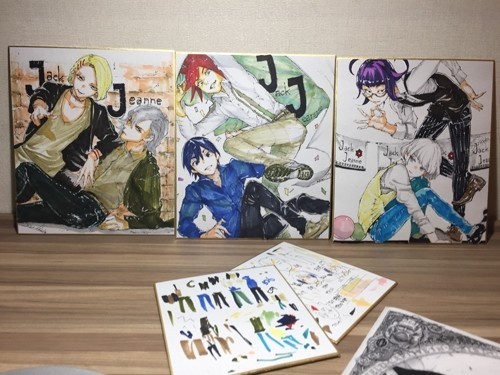
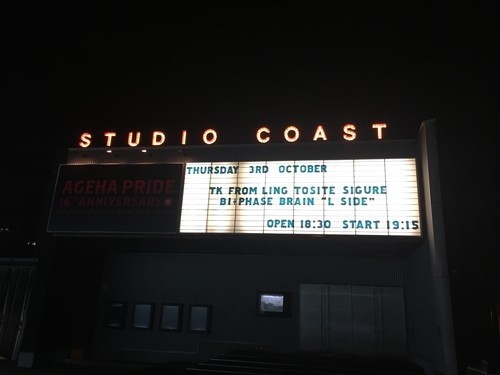
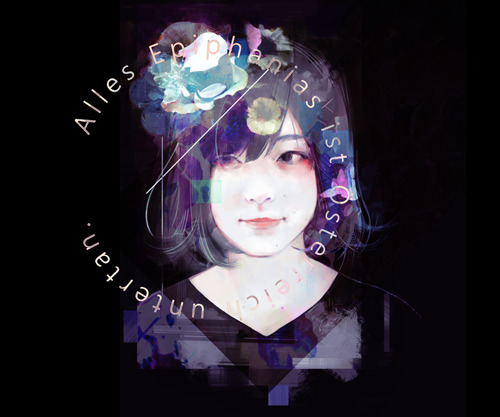
October
○ BU work

What’s hard about BU work is that it’s difficult to separate the layers according to the face, hair and clothes, and they all have to have the same style and touch to it.
If it was manga, then maybe...no, even in manga, there’s still some need to match the outfits, but it doesn’t really matter to that extent.
It’s because I don’t like game sprites.
“This character has so much energy from their sideways pose! Amazing!” This never happens…
Around this time of the year, my older sister called this elaborate task, “the task you’re probably the worst at.”
○ The bean life
I’m not really fat in particular, but I made up my mind to try dieting.
At the time, my body fat percentage was at 18%, and I’ve never been below 10% ever in my entire life, so I’m thinking of aiming for that.
Instead of eating rice with unseasoned chickpeas and black soybeans, I began my lifestyle of consuming vegetables and cuts of meat with less fat.
Hopefully I can achieve my goal in about six months’ time.
○ Ano-chan, Honda Keisuke, and I
After Ano-chan left “You’ll Melt More!”, her official Twitter account removed every single account she was following, but for some reason only two people remained.
Those two people were Honda Keisuke and Ishida Sui.
To Ano-chan, Honda Keisuke and Ishida Sui belonged in the same category.
After some time passed, even we were removed, but I consider this one of my hottest mysteries of 2019.
Ano-chan!
I’ll always be waiting, so let’s have tea some time with Honda Keisuke!
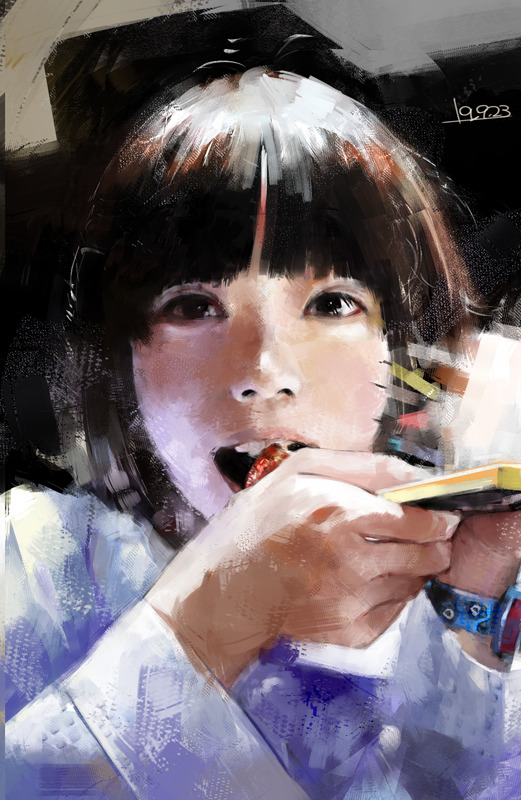
November
○ BU
Need I say more.
○ Main cast’s first recording session from the 26th - 27th.
I visited Tokyo with Towada-shi to supervise the main cast members’ recording session.
Wow, everyone was so amazing~
Of course, not just the main characters. Terasaki Yuka-san who plays the main character, Tachibana Kisa, was wonderful as well.
In this kind of game genre, the position as the main character feels less important than the male characters, but I want her to stand firmly in this story’s script.
I thought it’d be nice to have the main character not stand out too much and have her watch over the male characters, and I felt that Terasaki-san’s voice and acting fit that image perfectly.
About the cast members, it seems like there’ll be a chance to speak to them eventually, so I’ll come back again.
○ 1 month into the bean life
I’m steadily losing weight.
Basically I always work from home.
I go to the gym and supermarket 2-3 times a week. I started cooking for myself.
I got a brand new refrigerator to replace the one that suddenly broke. It actually cools things down now.
Living standards have risen.
December
○ I break off ties with M who I played TRPG together with.
He was a former classmate who was even chief assistant at some point during the series’ run, but eventually he ended up getting fired due to falling asleep at work.
He said he’d attend the last session for the story that day (although his own character had already died), and I was working on a schedule to accommodate him, but once again he cancelled at the last minute.
It’s fine to cause trouble for me (although I’ll probably get pissed), but I can’t overlook treating others the same way.
And it’s not the fact that his schedule didn’t match up, it’s because he was complete trash who didn’t know how to behave like an adult once he made plans with others, that I felt sorry for the other TRPG people who took time out of their schedules.
Since I felt ashamed when I was together with him, I decided I’d had enough.
This was a year where I cut ties with a lot of people, but I think what they had in common was that I was ashamed to be with them.
From now on, I don’t want to associate with such people.
What’s more, when I finally told him, he didn’t even try to deal with it and just gave up, responding, “So that’s how you felt about me. Okay. My bad.”
I won’t go anywhere with those kind of people again.
○ The bean life ⇒ the potato life.
I changed it to potatoes.
○ BU is over...
On December 17th, I finally finished the BU work that I spent ageeeeeeeees on.
Although I said that serialization is tough, as long as I finished 18 pages a week that was it (although there were times where I was chasing myself with other work), so I could finish it as long as I didn’t sleep.
I somehow managed to finish both the manuscripts and the colour illustrations this way, so expecting BU to be similar, I wasn’t really scared about it never ending, but BU truly was despair.
When is this gonna end? I’m even working super hard…
This is how it went on the entire time for over a month.
There were about 200 different sprites I had to make myself, including the different costumes and poses, and I had to do all of them.
For one thing, when, “This process is necessary,” came out, I had to go through the same process roughly 200 times, that it felt like I was facing the final boss who already transformed many times.
Also, it’s like not equipping myself with a lot of equipment and recovery items in the previous town, but the dungeon I somehow managed to enter is extremely dangerous and even though there’s no safe points anywhere in sight, the boss suddenly comes up behind you, and you go I’m gonna die I’m gonna die
○ If you eat a lot while you’re losing weight, you’re going to have a bad time.
On December 15th I had trouble concentrating, so I tidied up the living room, created a space in the middle of the room, and darkened the lights.
After an hour of meditating, only the sound of my breathing could be heard in the room, and so I went back to work with renewed concentration after confronting the issue (like a monk?).
On December 16th, I’ve been working the entire time since morning. I thought today was going to be the last day, but an entire day has passed and I don’t have any energy...
I’ll buy a midnight snack, replenish my energy, and end it once and for all. I’m trying to lose weight, but I went to the convenience store while thinking about how I’m gonna eat a katsu sandwich (I didn’t have the energy to cook).
While looking for something at a convenience store I can eat during weight loss, I think back over the last few months.
Like how it seems like BU is finally over, how a lot of things have happened, how I’m working hard, how lately I’ve been eating only potatoes, vegetables and meat.
And then I suddenly thought, “I wonder if the reason I don’t have any energy is because I haven’t had any rice lately.”
...I thought I should go on a diet in October, so I’ve been living a very modest life since then.
Thanks to that, my weight has steadily decreased, and my body fat percentage has gone down 3% to 15%.
What will happen if I continue with my relatively strict dietary restrictions during this difficult time?
...even if you’re losing weight, there’s a technique you can set up to binge eat during periods where weight loss stagnates, called cheat day (though results may vary), but what is it that makes no-cheating so inefficient even for weight loss?
...should I have a cheat day today?
“Huh, is it really okay?” I asked my mind. “Do it!” was the answer I got.
From that moment, everything around me morphed into things I could eat.
No exaggeration, my knees trembled.
I crammed into my shopping basket carbohydrates, carbs, more carbs…
It’s okay just for today, I say as I shove cream puffs, dorayaki, pudding, Family Mart chicken and ice cream.
(Even if it's a cheat day, it’s probably not a good idea to take non-nutritional foods, but shh.)
With food in both hands and in high spirits, the first thing I ate was the delicious part of the Family Mart chicken.
I groaned loudly, all alone in the room.
Alright, let’s finish this work! I was energized, but my blood sugar levels spiked so much that I felt extremely sleepy and went to bed instead.
The next day on the 17th, I wake up at 4 am and immediately notice something unusual.
My body is burning. I’m sweating.
I immediately wake up, and overflowing with energy, I head for my desk.
I’m working actively, and I finish the BU work.
It felt like I was pushing forward with only positive energy, feeling uplifted.
I break out a laugh at a slight joke I found funny from a foreign drama (The Mentalist) I’m playing while working.
The greenery of the plants and the lighted sink glisten, and the scenery is vivid.
What is this?
I suddenly recall the story of a YouTuber I saw recently.
He lives in a region where medical marijuana is legalized, and he explained in detail what changes would occur if you smoked cannabis.
To put it roughly, you feel calm and your senses sharpen. Trivial things can become funny, and funny videos can make you roar with laughter.
Then maybe...I thought, I'll watch Nagareboshi (a comedy duo) on YouTube.
Usually I go, haha, that's funny! But that day I exploded with laughter...all of their videos were just too funny.
I learned that when you’re losing weight and suddenly eat a lot, it alters your mind and body as if you smoked cannabis.
(※ Just to be clear, I don’t know what cannabis is like.)
Thus the BU work ended with me being high as a kite.
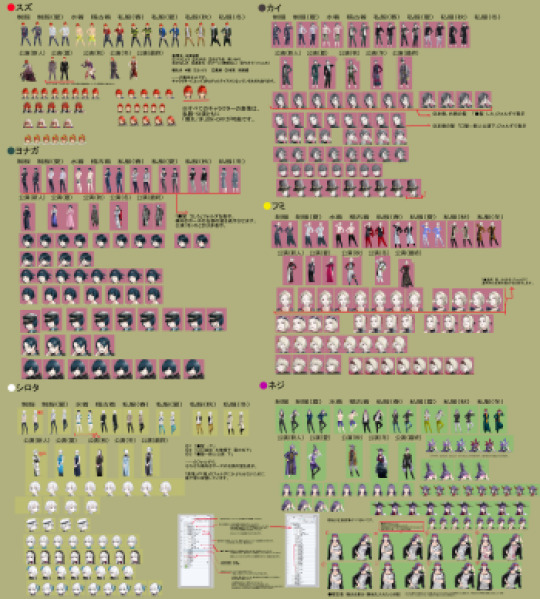
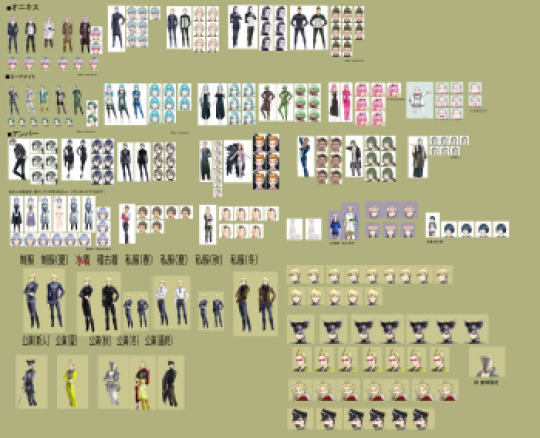
(※ I’m covering it with mosaics for now. I’ll remove it once I can announce it.)
○ I stopped playing TRPGs.
I’ve been doing it for about two and a half years, but it also helped me in honing my creative skills.
I’d sometimes perform, so it was useful when I was recording the scratch vocals…
It was a good experience, managing to vicariously live the energy of ending a story.
It was a story about a group of friends, so it was easy to appreciate.
Summing up 2019
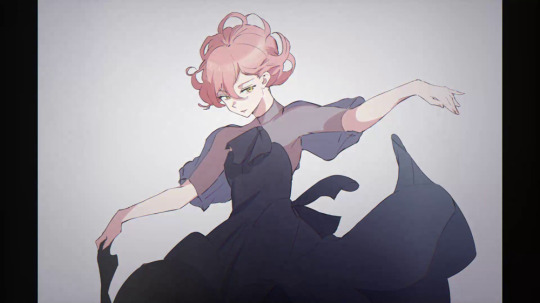
After the weekly series finished in 2018, I was in a daze for a few months, but in 2019 I worked only on Jack Jeanne for the year.
This year I tried various things, and trite as it may seem, felt the possibilities within myself expanding.
I had many opportunities to realize how important it is to keep a distance from bad things that don’t do anything for me.
During my work on Jack Jeanne, I vaguely thought about my future creations.
The work I’m doing now in game production is fun so I wonder if I can keep working in this field, but I’d also like an environment where I can release things more constantly.
I can’t promise anything specific, but I’m going to work on things that I want to do.
I look forward to what 2020 has to offer. Have a happy New Year.
2019.12.31 Ishida Sui
124 notes
·
View notes
Text
zine thoughts pt 2
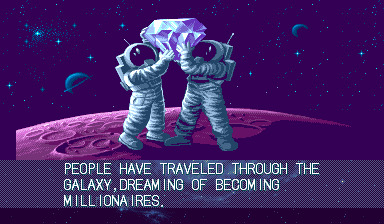
where do you sell videogames? zine fairs, children's book stores, used record marts, from the trunk of a car like rudy ray moore, on etsy or on craiglist, with flyers on the wall of the local chip shop or library. through awkwardly hammered-together handmade electronic systems or the reverse, turning your game into a jumbled set of paper text and graphical fragments which can be sold in boardgame stores as some kind of reconstruct-the-narrative puzzle.
you could make one-off bespoke games or game simulacra for movies that want to depict some kind of videogame being played onscreen without having to go through the licensing rights. you could ghost-develop games for wealthy people to put their names on ("american mcgee presents my life with princess diana by donald duck").
you could develop training games for the military-industrial complex, ha ha ha ha. you could get funded by the CIA to ensure the medium of videogames remains sufficiently arty and rehabilitated to function as propaganda for capitalism... i mean we already know they were involved with the paris review and iowa writer's workshop and all that jazz so they gotta have least a couple people on the payroll already, right, and we will all be treated to some very entertaining revelations following the inevitable freedom of information act request 15 years down the line.
you could try connecting with the little self-contained fan communities for things like touhou, fnaf, undertale, m-minecraft, like those renaissance artists who had to drop their patron's face in the background of some religious scene except in this case it would be one of the homestuck guys. you could make "trainers" for more popular games, or demos that could show how they "feel" without a $60 investment.
you could sell small games as assets for larger ones that want to have some kind of in-universe playable arcade system without having to invent a whole new game from scratch. you could just make extremely specific forms of pornography, maybe not the worst option even, just make sure the very artistic sequences of the protagonist remembering his dead wife are broken up every now and then with scenes of him unhinging his jaw to swallow and slowly digest another, smaller sad games protagonist whole (with rumble function for controllers!!!).
you could make games for all the people who are still on windows xp or earlier or have some kind of arcane video card setup that prevents them playing anything other than that one preinstalled pinball game. you could try selling them at street vendors. you could try learning another language and making games for non-anglophones that don't sound like an english-written game that was localised without much thought after the fact.
you could make games for kids in the hopes that they sexually imprint on them enough to support your erotic oil paintings of the characters 10 years later, just like nintendo. you could make an extremely interesting and thoughtful videogame and then offer not to release it if the donation threshold is met, thus sparing people the emotional obligation of having yet another thing on their should-play-this-eventually list. you could develop games with some bewildering system of in-game and real-world currency interactions and then sell it to the mob as a way to launder money.
you could make videogames that robots record themselves playing to upload en masse which are then watched by other robots as part of some weird, ungraspably abstract SEO economy, or better yet make robots to make the videogames as well. you could make virtual cemetary plots either private (downloadable exe) or public (hosted on the server) with their own customisable mood-themes and weather settings (dark, stormy, remember-you-will-die; sunny, quiet, circle-of-life etc). you could make prosperity orbs.
you could make games for office workers or call center staff which resemble excel documents or phone system frontends from a distance. you could make games which really ARE excel files, some dense collection of interlocking hidden formulas that change to display text and ascii characters as you tab your way through. you could probably talk your way into "adapting" any of those old IPs that still float around long after anyone stopped having any particular thought or feeling about them at all, like the flintstones or ziggy or something, maybe do like those 1960s superhero cartoons where they just filmed panels from the comics - just break a 2d flintstones cartoon into constituent elements and have them hover around in a little cutout diorama that you fly thru, possibly explained in-universe as representing the 4-d vision of the great gazoo. you could make games that play themselves, for the depressed. you could become a ghastly serial m**derer where after each crime you upload a new game to itchio which will reveal the name of your next victim, and costs only $9.99, and of course everyone buys and plays it because the police have put up a reward for solving the crime because they can't get past the dinosaur on level three, and all seems lost until some plucky young computer student who found the game on a friend's hard drive manages to solve the riddle hidden within the game's structure, following the clues, to an old castle, she knocks on the door, it's opened by, yes, it's will wright, wearing a wizard outfit, who tells her that by dint of solving all the puzzles she is now invited to join that mysterious organization known as "The Elect" which is assembled from the finest minds in all game design with a view to secretly controlling the world economy (via "werewolf blood", somehow), that she need only complete the ceremony by sacrificing one untutored soul, he holds out an ornate knife, she hesitates........

the question is where to sell videogames rather than how because for the most part we already know how - there are a million more or less instructive articles out there about hitting up conventions or talking to the press, and it's not that they're wrong, exactly, more that they expect to be applied in an environment that no longer exists. but what should preface and qualify the idea of sheer volume swamping the indie games market is that, outside of a few small pockets, there never really was an "indie games market" to begin with - indie games drew and mostly still draw on the existing videogames market, rather than constituting a new one. it's telling that the glory days of indie games were just the ones where they were able to draw upon some of the same privileges larger titles already had in the ability to access that same audience - being frontpaged by steam, say, or making it onto a comparatively closed console platform, or generating earnest thinkpieces... you could say that they were tapping into structures the industry had already built but had not yet occupied to full capacity.
of course there are exceptions and various efforts to set up new economies for small weird interactive things (like patreon, or game bundles), and some efforts to reach outside the existing games audience likely were successful - but when we think of indie games "functioning" economically, whether that means supporting a small team, a single person, or just hitting minimum wage per hours spent, i believe we're mostly still talking about ones which are built around the existing games economy. which is fine, but i think it's also intrinsically precarious in ways which maybe get glossed over in discussions of the "indiepocalypse" - are all those new steam releases really causing a problem or are they just exacerbating a structural limitation which was already always there, a reliance within the indie game economy on a certain lucky-few-ism which just became grossly more noticeable the more disproportionate it got?

of course it's easier to be dismissive after the fact, and my fantasy about "where" to sell videogames is partly a fantasy of them having a location to begin with - of attaining something of the grounded and immutable appearance of the non-digital, as though brick and mortar stores don't have a relationship to the likes of amazon as basically precarious as any online storefront. and there are also real and obvious reasons why the various videogame audiences all tend to clump together - similarities in terms of the hardware required, the inputs allowed, of visual and cultural reference points, to say nothing of the personal / professional histories of the people involved in each. we are all contained within "the medium"...
so maybe it's also a fantasy of starting to pick apart that conception of the medium. i think small game developers already have more in common with artists or musicians working on the fringes of their respective industries than they do with even moderately successful teams within the same format, and use similar language, engage in similar forms of practice - particularly as near everything comes increasingly mediated by the digital these days. i think they already ARE working in similar spaces to some extent, whether it's social media sites or digital storefronts or meatspace stores pushed by necessity not to specialise. and without wanting to be paranoid (or moreso than the CIA thing, at least) i think we should be cautious of the way a certain focus on mediumicity can obscure these overlaps. a "new medium" is one which inherently pushes against the image of one as grouded ahistorically in some eternal human verity or other (where each medium supposedly embodies some different mode of perception / medieval humour / ninja turtle etc) - it is to see firsthand the way in which supposedly eternal, neutral qualities are materially constructed, which includes seeing forms of social organisation and usage become mystified into extrahuman conditions. and given their basis in technology that includes drawing from wider trends in the use of that technology as a whole - which specifically, in tech circles, can mean more and more tightly interlocking systems of proprietary knowledge and speculative capital, as well as "new mediums" constructed so as to be inseperable from some storefront, website or monitoring technology.
i don't think anybody will necessarily break even taking their games to a zine fair (not that they're breaking even now). but i do feel like trying to build networks across those medium boundaries could be more valuable in the effort to build some sustainable environment for these things than any amount of reform within the house that tech built.
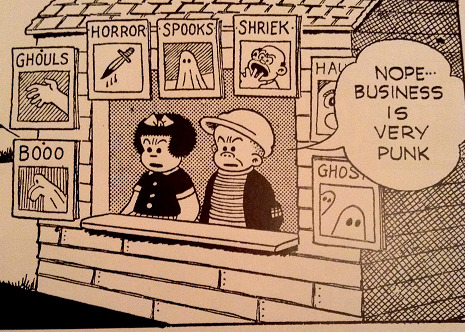
[PS: it occurs to me that you could plausibly argue that the very bagginess of medium-centric formulations is what makes them valuable, in forcing many different groups to butt against each other on one platform rather than just disperse into echo chambers. but i think exactly the reverse is the case: nobody really engages with each other's work in artgames because the stakes are simultaneously too small and too large. they're too small in that however much i might be picky about another person's work - and i think it's this vague pickiness or sense of not-quite-right-ness that drives the most searching critiques - it still feels pointless to pursue that instead of the glaring, omnipresent faults of the big AAA players, which means more complaining about far cry for all eternity. and they're too large in that most small game development is so precarious that it's not really worth the risk of knocking someone out of the circle over penny-ante shit. only with both economic security and broad similarity of outlook can a truly vital, human culture of spiteful cattiness begin... our day will come]
(image credits: Eco Fighter, World Heroes 2 ,The Space Adventure, Nancy)
17 notes
·
View notes
Text
Blind Ambition: Heroic story of Canadian pilot takes flight in new film by local filmmaker

Filmmaker Frederick Kroetsch, photo supplied by the artist.
When it comes to filmmaking, Frederick Kroetsch is a man of many talents; he has worked as a reporter, camera operator, host, director, TV producer, and he currently runs Catapult Pictures with his wife Rebecca Campbell. He has produced thousands of broadcast stories covering everything from Cattle Police to Astronauts, and as a documentary filmmaker, he has filmed in countries around the world. He has created dozens of projects that range from comedy web-series to feature-length documentaries. He is currently nominated for two Alberta Rosie Awards: Best Screenwriter Unscripted under 30 Minutes and Best Cinematographer Unscripted over 30 Minutes.
And now Frederick has one more notable career highlight to add to the list – the world premiere of his new short documentary Blind Ambition: The Wop May Story at the Edmonton International Film Festival.
Shot on 35mm filmstock with an orchestral musical score, Blind Ambition brings to life the story of an inspiring and courageous pilot:
After learning to fly in WWI, a young Canadian man returns home to start a bold career in aviation. Barnstormer, lifesaver, and intrepid bush pilot, Wilfred ‘Wop’ May proves the value of flight to the world. But an old injury requires catastrophic vision surgery and forces him to admit he’d done it all with only one good eye. Now grounded, Wop continues to push aviation forward by running training schools for pilots and navigators in WWII, creates the first Air Search and Rescue service, and opens the Arctic and Pacific Rim to commercial flight. But this dedication leaves little time for family, and upon Wop’s death, his teenage son discovers how little he really knew his father when he travels the North and hears tales of his adventures, heroics, and generosity - the legacy of Wop May.
In anticipation of the film’s premiere, we connected with Frederick to learn more about his career as a filmmaker and the process of telling the incredible story of a Canadian aviation hero.

Q: Tell us a little bit about yourself as an artist. How did you get involved in filmmaking?
I got invited to film with some friends when I was in grade 6 – I think we were shooting a Doctor Who spin off. It was gloriously terrible. And we didn’t stop. Video tapes were cheap, and editing was difficult. Following the innocence of Hi8-video I got a fine arts degree at the Concordia film school in Montreal, became a TV journalist for 10 years, and then went back to filmmaking. Currently I enjoy balancing commercial work with smaller art projects.
Q: Your film Blind Ambition tells the story of legendary Canadian pilot, Wilfrid “Wop” May. What drew you to his story?
I recall hearing about him when I was a journalist – I always wanted to find a way to make a project about Wilfrid ‘Wop’ May. Years later I was debating the idea of filming a stop-animation art film about him. I visited the Alberta Aviation Museum to learn more and discovered a lot of new details. Wop was way ahead of his time. Against the social conventions of the day, he hired the first female and Asian pilots. He survived a dogfight against the Red Baron by not knowing how to fly. He did aerial stunts, saved lives, and helped open the arctic with his bush plane. And HE DID IT ALL WITH ONE WORKING EYE. That’s crazy! It’s a story that demands to be told!
Q: You describe the film as a creative documentary. How does this style of documentary differ from the style audiences are likely more accustomed to, and how do you think this form of storytelling added to the story of Wop May?
What I refer to as a ‘Standard Documentary’ is what we see quite often on the news or on Youtube – talking heads interspersed with ‘B-roll.’ Which is a great style for disseminating information but is rather uncinematic.
When discussing Wop May, I felt emotive forces reminiscent of watching adventure films from the 1980s like Indiana Jones. I wanted to find a way to recreate that nostalgic, inspired feeling. Also, we didn’t have any photographs for some of his amazing adventures. So, we decided to film dramatic recreations in two different ways. The first method was with designing comic books that we filmed, and the second was live-action recreations using actors, props and costumes. We filmed in real airplanes with stunt pilots. And we shot it all on 35mm Kodak film stock. We also shot it on anamorphic lenses, which squeeze the image so you can have a classic widescreen aspect ratio. These elements helped to create the atmosphere in which to tell Wop’s life story. I wanted the audience to feel like a kid watching Indiana Jones for the first time, except with a documentary about a real person.
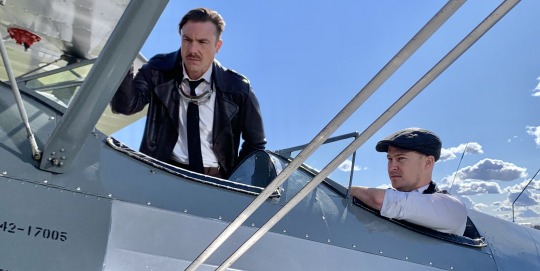

Top: Actor Jesse Gervais with stunt pilot Ted Reynolds, photo by Frederick Kroetsch . Bottom: School room scene from Blind Ambition, photo by Frederick Kroetsch.
Q: Tell us more about your decision to shoot with 35mm film. What were some of the challenges and rewards to using 35mm?
Our cinematographer David Baron really pushed us to shoot on 35mm Kodak film stock. As much as that sounded like a cool thing to co-director Tom Robinson and I – and it’s pretty cool – we weren't entirely sure that was the best move for us. It’s expensive and you can’t tell if it worked until weeks later when it’s processed. Also, we had VERY little money. We tried it out… and it was beautiful. The grain structure of the film stock perfectly emulated that nostalgic blockbuster feel. Tonally, it fit well with the visual language of historical archives like 8mm and turn of the century photography.
Shooting on film meant we had to change the way we normally make films. We could only do a few takes of each shot – which meant everything had to be rehearsed and perfect. The camera is huge and heavy – which meant we focused more on creating movement in the frame. We had to use a tape measure for focusing – it forced us to be more aware of details. Our artistic process was able to step back in time and enjoy the madness of cinema before it became digital. We are intending to shoot more of it.
Q: For the film, the score was created with a European orchestra. What was it like to work remotely with the Prague FILMharmonic Orchestra? Were there any other collaborations (either local or international) that helped achieve the vision of your film?
Composer John McMillan was the artistic force behind our musical score and the orchestra in Prague. I had just worked with John on Rebecca Campbell’s documentary The Secret Society, and I wanted to work with him again. As soon as he heard the words ‘1980s adventure films’ he was instantly on board. He spent weeks writing the music, and then he hired some recent graduates from the MacEwan class that he teaches for the notation. John also secured a grant from the MacEwan Music Department to record with the Prague FILMharmonic Orchestra a 50-piece orchestra.
The recording took place in a studio at MacEwan. We had a live video feed to the studio in Prague. Someone handed me a stack of sheet music – I stared at it confused. A conductor began speaking in Czech. Then the music began, and we recorded for 3 hours. After that the score was mixed by Paul Johnston, and then went into post audio with Johnny Blerot. It was a lengthy process, and we’re lucky to have worked with so many professional artists.
Q: What do you hope Edmonton audiences will take away from the film?
Wop May is all around us in Edmonton. There are numerous murals on the sides of buildings. The neighbourhood of Mayfield is named after him – that was where he landed his planes. The Blatchford Hanger is where he worked in WW2. I want people to watch this and feel like they’re a kid again, excited and amazed at a good story. And then ask the question – what is a hero?
You can catch the world premier of Blind Ambition: The Wop May Story at the Edmonton International Film Festival on October 3, 2021, 5:45 PM at Landmark Cinema 9 City Centre. Click here for more information about tickets and online viewing options.
0 notes
Link
The hot new thing in tech: speaking into your phone “This is my way to debrief and tell everybody what’s going on,” she told CNN Business. “It’s not like it used to be where I would wait until I was going to see my friends over the course of the next week for drinks or for brunch.” For years, Apple and others have offered the option to record short messages and send them via text and chat apps. But the format has gained new appeal for many in the United States during the pandemic as we approach a year of limited opportunities to socialize with friends, family and coworkers. Romina Hyskaj, a 23-year-old recruiter who lives in New York City, uses them mainly to keep in touch with her parents who live six hours away, noting that “it can get your tone, attitude, or joke across.” Nick Hofstadter, a 38-year-old luxury travel adviser in Los Angeles, sends voice notes to a handful of close friends, mostly to tell funny stories with a more “dramatic effect” and to avoid sending long text messages. (He prefers using voice notes on iMessage over Instagram so he can listen to it before sending.) And it’s not just voice messages. Voice is having a moment — and the tech industry is taking notice. Clubhouse, a buzzy audio-only app where members join virtual rooms to have live, unscripted discussions, launched early in the pandemic and now has 10 million weekly active users and thousands of “rooms,” according to a spokesperson. Facebook and Twitter are both experimenting with their own versions of Clubhouse. Twitter has also launched voice tweets and voice messaging within direct messages in select markets within the past year. Twitter spokesperson Aly Pavela told CNN Business people are “now using their voice to speak for hours on end” about topics ranging from mental health to skincare. Facebook, which already offered voice messages in several of its products, said it’s seen this format increase in usage on Messenger in the US over the past year. Discord, which offers voice channels, is also immensely popular. (Apple declined to comment on usage of its voice memos.) Clubhouse’s two founders, Paul Davison and Rohan Seth, summed up their thinking on the power of voice-focused products in a blog post shortly after the app launched last year. “Instead of typing something and hitting Send, you’re engaged in a back-and-forth dialogue with others,” they wrote. “The intonation, inflection and emotion conveyed through voice allow you to pick up on nuance and form uniquely human connections with others. You can still challenge each other and have tough conversations — but with voice there is often an ability to build more empathy. This is what drew us to the medium.” Voicemails 2.0? The rise in voice tech is a throwback to an era that was supposed to be long over, when people left voicemails and spent hours talking on the phone. “The telephone call is a dying institution,” declared a CNN story from 2012. Similar stories from the 2010’s noted how teens prefer texting to calling, and how even a ringing phone for older people can feel like a nuisance. Now, voice is once again part of the future major tech companies are betting on — as evidenced by the Clubhouse wave. The company reportedly raised $100 million recently, which valued it at $1 billion. “It feels like a 1990s flashback when chat rooms were all the rage … the same thrill of interacting with strangers, the same challenges of managing inappropriate and hostile behavior, and the same curiosity from users about learning about a new technology,” said Jeffrey Hall, a professor of communication studies at the University of Kansas and the author of the recent book “Relating Through Technology.” “Maybe people find it more enjoyable right now because of the shut-in feeling of the pandemic and the desire to connect with others, even strangers,” he added. But Hall cautioned that like chat rooms, voice chat apps could “fall by the wayside” as people move on to other things when life goes back to normal — with the possible exception of a “small niche of users” who could choose to stick with this format. Voice messages, in particular, have long been popular in other parts of the world, with some using them to do everything from interact with delivery workers to chatting with loved ones who live overseas without having to “think about the time zones you’re in,” according to Aleena Khan, who runs a cosmetics startup in Dubai and uses the feature. Himanshi Parmar, a 27-year-old visual designer and artist in Goa, India, has also found voice notes can help cut across generational barriers with her mom, who “hates typing and hates using the phone.” Now, voice notes — and perhaps voice features generally — are becoming more ubiquitous in the US for a range of reasons including convenience, the need for intimacy at a time of isolation and the desire to avoid the hassle of setting up a video call (and to look presentable). Plus, many are likely feeling some Zoom fatigue. “For so many of us, we’re separated from family and friends right now,” said Carla Bevins, an assistant professor at Carnegie Mellon University’s Tepper School of Business who specializes in online and interpersonal communication. “Using voice notes lets us imbue closeness, love, and connection within our messages.” Hall said an added part of the appeal — beyond conveying more emotional nuance — is how easy voice notes are to record, store and replay. “Back when we had answering machines, people used to save important messages, particularly from loved ones, sometimes for as long as the machine had space and power to store those messages,” he said. “People don’t use voicemail in the same manner, partly because the phone is not the easiest way to leave a message for another person — that would be a text.” Prior to the pandemic, Giuliani said there were many friends she didn’t talk to daily. Voice notes have changed that. “It’s kept some of my friends and I really close together,” she said. “We send over voice notes and we’re chatting every single day, way more than we ever did before the pandemic.” She added: “I can’t believe that we didn’t before.” Source link Orbem News #Hot #Phone #Speaking #Tech #Thehotnewthing:speakingintoyourphone-CNN
0 notes
Quote
What it was like to be Paul Rand's Daughter"
from a speech given in his honor after his death
Good evening, it is a great honor and a privilege to be here, tonight.
I have been given five minutes to speak about what it was like to be Paul Rand’s daughter. Some of you in the room knew my father. Those of you who did, know that is an impossible task! But I will do my best.
In two words, not easy! But it was always interesting. My father was the most brilliant, creative, fascinating and difficult person I have ever known.
I am proud to be his daughter. I loved him dearly, and always wanted him to be proud of me. My father had a very difficult childhood. He grew up poor in an Orthodox Jewish family in Brooklyn. He had an identical twin brother, Philip, whom he both adored and envied. Philip was much more extroverted and socially at ease than he was. His parents owned a small grocery store and my father and his brother had to sleep in a loft where the bread was stored, and there were rats. My father absolutely hated rodents. My grandfather was a gentle, sweet, pious man, and my grandmother was the opposite. She ruled the roost with an iron fist. She had a pronounced hunchback, a crooked nose, and wiry white hair she wore in a bun—she looked exactly like the Wicked Witch of the West to me as a child and I was completely afraid of her. I never heard one positive word come out of her mouth. I was once told that the reason she didn’t say anything encouraging or positive to my father or me was because it was considered to be a jinx, in a certain branch of Judaism. My father drew like an adult at the age of three with charcoal he snuck from the fire, receiving not one iota of encouragement from his parents because drawing was essentially considered a sin, as it represented the “reproduction of the graven image.” I was awed that in spite of such blatant discouragement, he persisted. My father’s talent and drive were so intense that wild horses could not have stopped him. One terrible story I remember hearing from my mother happened when my father and his brother were about five or six years old. Their mother had gone to the store and they decided to mop the kitchen floor to make her happy. One of them accidentally knocked the bucket over and suds bubbled up everywhere. When my grandmother returned she was so angry that she whipped them severely. This is not the kind of childhood that engenders emotional well-being. My father was so driven to pursue his passion that he lied about his age to get into Pratt and Parsons art schools. At fourteen, he took the subway into the city at night, after a full day in high school. My father was ashamed that he only went to art school and not college, although he was awarded many honorary degrees throughout his career. He was one of the most well-read people I know, usually reading at least ten books at a time.
You might not be aware that my father was a very picky eater. While he did not keep Kosher, he did not like to eat butter or cream with his meals. My father would bark to the server that he did not want any cream or butter on anything—“Just plain!” Once he took my college boyfriend and me to a very elegant French restaurant in Boston. When he ordered, he loudly stated, “No cream! No butter! Just plain!” Within minutes the Chef came out with her hands on her hips and said, “Sir, do you realize that this is a FRENCH restaurant?? And in French cuisine nearly everything is made with cream and butter?!” Andrew and I wanted to creep under the table.
My father was the most visually oriented person I have ever met. In some ways, this was a curse because he was bombarded by visual stimuli everywhere he went. Perhaps this is why he always worked at home and had his clients and students come to see him. His home was his shrine. It was serene, stunningly beautiful, modern and so elegant in its simplicity and grace. He felt most at peace in his home or in Europe, where design and beauty are abundant. My mother told me that when my father was depressed she would encourage him to take her to Europe, as that elevated his mood.
It must have been very difficult to be Paul Rand, in part because of his overwhelming visual perception. He absolutely could not stand what he perceived as ugly. On one occasion when he came to visit us in Cincinnati and my son Troy was about two years old. We went to a Bob Evans restaurant, where he reeled at the sights: “Look at that wallpaper with that rug! Oh God! Those pictures! Look at that lady’s outfit!” While I would be mortified by his usually too loud comments, I can now see that he almost felt assaulted by visual stimuli. Most of us don’t suffer from what we see.
My parents divorced when I was three and a half, and I never lived with my father again. My mother and I moved to Manhattan, and I saw him every other weekend until I was nine when we moved to Los Angeles. The visits became much less frequent then. He might come to LA once or twice a year for a weekend, and I would go to Weston for a two or three weeks in the summers. My mother told me that my father adored me when I was little and still lived with him. When I was a colicky baby, my father played the accordion to soothe me to sleep. He loved to tell me that story. I believe I was indeed the apple of his eye then. Sadly for both of us, life tore us apart and it was never the same again. My father lived for his work. He was not a people person. He could be crass and cruel. I remember times when students came over to show him work they had toiled over and his loudly exclaiming, “This is shit!” As hard as he was on me, he was more brutal with them. Although my father wrote so beautifully about art, he was almost coarse when talking about it. And as playful as his art was, he was sour and serious much of the time. It almost seemed as if he only had fun when drawing or creating. Whenever he was at a restaurant, he drew all over the tablecloths—the most playful and beautiful things. I wish I had kept some of them!
I once asked my father what I could do that would please him, and he said, “Marry a Jewish man.” I didn’t. He announced he wouldn’t come to my wedding unless we were married by a Rabbi. This proved quite difficult since I had not really been raised Jewish and did not identify as Jewish, and my ex-husband, John, was an Atheist who had been raised Methodist! Happily, my father did come to my wedding, and did walk me down the aisle. I know if there is a Heaven, he must be very happy now because my boyfriend of the past five years, Howard Wolkoff, is Jewish. So I am finally partnered with a Jewish man!
My father was an artist, designer and genius. My mother was an architect, writer, painter and a great beauty. My genes were loaded with creativity, and I am quite a creative person. People wonder whether I inherited any of my father’s artistic talent. As a child, I drew prolifically. When I was eleven, I traveled to Spain with my mother and stepfather. One evening we had dinner at the Ritz Carlton of Madrid. It was always a late night out with adults for me, and I would draw to entertain myself. That night I drew bulls and all the waiters lined up to get one. I have always loved horses and used to draw horses, stallions in particular. One of my white stallions appeared in a book of children’s poetry when I was about eight, but sadly I don’t own a copy or even know the title. I stopped drawing when I was about thirteen. I was simply too intimidated by my father’s overwhelming talent to continue. My sons, Troy and Brody, are both profoundly talented in art. I believe that some of their grandfather’s gifts shine on in them. My other passions were music and writing, and although I wanted to become a professional singer for many years, I became a Clinical Psychologist. When you have a complicated childhood, sometimes you want to heal yourself by healing others.
The most healing moment I ever had with my father happened while he was dying. I am so grateful that I did not heed his mandate not to come see him. When I walked into my father’s hospital room four days before his death, he looked up at me smiling and said, “Hi Pooky!” I was blessed to spend my father’s final days at his bedside. He did not believe he was dying, although he had advanced colon cancer which had tragically been misdiagnosed as an ulcer, so it was not caught early enough for treatment to be effective. Since I was working as a geropsychologist in nursing homes at this time, I knew how to take care of older people. A death from colon cancer is very unpleasant. I sat next to my father nursing him as best I could, holding his hand all the while. I just wanted to be with him, to cherish that connection with him in his final hours. At one point he looked at me and said, “You are a terrific nurse!” The next day he said to me, “Catherine, you are completely transformed.” I replied, “Daddy, I have always been this way.” My father was sarcastic to the end: “Well, it takes a crisis to bring it out!” And I said softly, “No, Daddy, it took a crisis for you to see it.” I guess that is the saddest thing to me about our relationship…small-my father couldn’t really see that I am a good person or to really know me until his dying hours… It meant the world to me that he finally seemed to know and appreciate me, and I am grateful for the days I spent with him at his parting.
Catherine Rand, daughter of Paul Rand
1 note
·
View note
Text
WebDev Chat: Lessons for Marketers & Complex Web Elements
One of my favorite "perks" of working at IMPACT is that I am privileged to work alongside some of the smartest people -- who are genuinely experts in what they do -- every single day.
But how often do I go out of my way to learn more about what others do? Not very often.
That's why I've set a challenge myself to learn more about the area of expertise under the IMPACT roof that is the most foreign to me -- web development. To achieve this goal, I'm going to sit down with IMPACT Senior Front-end Developer Tim Ostheimer once a month to talk to him about what he does and why, and what us marketers can learn from his background and experience.
Because, for two groups of people that need to work together a lot -- marketers and developers -- I think we could do a much better job bridging the divide between us.
Enjoy!
Can you tell me about your background and how you got into web development as a career?
Tim: I have a bachelor's degree in Interactive Digital Design from Quinnipiac -- that's what they called it -- which was mostly digital graphic design using Photoshop, Illustrator, InDesign -- pretty much all of the Adobe tools. We studied typography. We did some animation and 3-D modeling. We did print design, and we did some web development.
I enjoyed all of the classes I took at Quinnipiac, but within the first few semesters it quickly became clear that there wasn't a specific medium or direction that the major focused on. Instead, it was more of an opportunity for students to experiment and come to their own conclusion of what they wanted to gain from it.
This was the perfect environment for me to learn in.
I started experimenting with image editing and HTML when I was young, but it wasn't until around 9th grade that I started challenging myself to learn more and take the hobby seriously. I spent a lot of time building websites about video games I was obsessed with and I wouldn't stop working on them until I was satisfied with the way they looked and functioned, even if the only person who would ever use them was myself.
We had a few elective classes in high school so I made sure that I took every class that had anything to do with computer science, photography, graphic design, and web design. These were very introductory classes, but it was a time in my life when I was starting to think about college and further education and these helped reassure me that some kind of digitally-focused career would be appropriate for me to pursue.
At that time, I was too inexperienced to know what kind of options there were. I knew that I enjoyed working with websites and code but I also had a lot of interest in everything related to design and I didn't want to pick a major that focused too heavily on one thing.
While looking at colleges and majors, I had a lot of trouble finding one I was confident about. I ended up specifically ruling out art schools because I still needed time to explore my options and wanted a more well-rounded experience. Quinnipiac's program was appealing to me because it had just that -- a little bit of everything.
I started with what I thought I wanted. I chose Quinnipiac and began my first semester with a predeclared minor in Computer Science. Unfortunately, I didn't really know what I was getting into. The course focused heavily on object-oriented programming which was different from anything I was familiar with and I struggled with every assignment and learning the material. So, I decided to drop the minor after completing the second course in the curriculum.
Instead of choosing a new minor, I decided that I was going approach my education in the same way that had gotten me to that point.
I filled my elective courses entirely with classes in related subjects that I'd be able to use to support my major. That way I'd have a better understanding of the processes and would be able to apply that knowledge regardless of the industry I ended up in.
I took classes with the film students and learned a lot about something I knew nothing about. In addition to filming, each of the courses focused on video editing, motion graphics, special effects, and/or sound design, and all of it was interesting and exciting to me.
So, I didn't stop there. I took classes in game design and development, and learned about mechanics and all of the different roles that are involved in the industry -- from the world-building aspect of the storytelling to the specific code that's written for the interface to ensure the experience is immersive.
Sometimes there might be an entire company that's focusing on just one piece, and that realization helped me to understand that it was okay to not be talented in every area of the design process.
Each of these courses gave me a different perspective on visual design and enabled me to apply what I had learned in everything I created from that point on.
During my third year of college, while I was taking courses in game design and animation, I ended up revisiting object-oriented programming. I had decided that I wanted to create a functioning game as a combined final project for these two classes but I couldn't do it without learning some new code. I spent countless hours outside of class and on weekends to learn the very thing that I struggled with the most.
But this time, it didn't feel overwhelming. Instead, there was a point where suddenly everything made sense and I became passionate about it in the same way I was about everything else I had learned.
The code now had a purpose, and it encouraged me to spend time learning what I wasn't able to understand the first time. I ended up spending more than 50 hours on this one assignment and combined all of the knowledge I had learned from my classes in different majors.
I wrote an elaborate story on which my game was based, drew every frame of every character's animation and the world around them, designed an interface which supported my theme, and coded all of the functions that were needed to make it all work.
The result was an amateur game and my favorite portfolio piece from college that I will forever be proud of. I still occasionally dig through my folder of creative work every few months just to play it for a few minutes to appreciate and remind myself of how much I learned from it.
In case you're curious, this is what it looked like:
Sorry, your browser does not support this video
Because I had so much fun building that one, I ended up taking part in a challenge called Global Game Jam that same year. The task was to design and build a game using any medium within the span of a two-day period based on the theme "heartbeat."
Sorry, your browser does not support this video
Before Quinnipiac I didn't realize there was a development side to design. I didn't think much about that fact that most people specialize in one part of the process and the designer of something like a website or a game is usually different from its developer.
What interested me the most was how each of these roles overlap and contribute to combine their work into a single unified experience. Rather than being concerned with the fact that I may not be pursuing the same career path as other students, I challenged myself to learn from every major that had anything to do with design and the various forms of digital media -- and it was the best decision I've ever made.
In the end, I decided that web development was the most appropriate career for me and that choice ended up leading me to work at IMPACT building great experiences for our clients and the users of their websites, but I can confidently say that working with students with entirely different career goals ended up teaching some of the most useful lessons I've ever learned.
Are there challenges to people not understanding what it is you do as a web developer or your processes -- how they're built or why they're structured a certain way?
Tim: Yes, we see a lot of confusion regarding development concepts or specific functionality, just because it's so technical.
With design, a marketer who's not a trained designer can still talk about specific elements of a design and understand their purpose. There may be things that they may not know are best practice -- like some of the principles of typography or user accessibility. But, for the most part, they can look at something like a Photoshop mockup and envision that as a page.
When it comes to the intricate parts of functionality, determining how difficult something might be to build, potential drawbacks of an adjustment to a design, or the technical side of how their website gets built, however, those are things that marketers have a lot of trouble talking about.
This matters a lot when scoping a website redesign project for a client because it's difficult to try estimate something like timelines or effort involved for a particular task without knowing the full context. Without having a design available where we can specifically reference an exact example, it's hard for us to estimate how long something might take, because it usually comes down to understanding all of the individual parts that are combined to build it.
If I look at a design, I can tell you about how long it might take me to build it. But it's really hard for me to provide general guidelines that always apply for scoping because even a minor change to a design could drastically change the way it has to be built.
Moving something over just a couple pixels could sometimes require an entirely different code structure, and adding in one small feature might mean that the rest of a page has to be built so it doesn't interfere with it. Sometimes a small request can end up being a lot of work, and it can be hard to identify those even if you are a developer.
What would you say are some of the most common tasks or website elements that, may seem to someone like me that would take a short amount of time but, actually take a lot time?
Tim: In certain situations, one would be changing things on mobile.
Developers don't determine what content is written on a page, so we have to balance flexibility with structure. Depending on the way the page needs to adapt for different screen sizes, it can be very difficult to ensure the layout is indestructible without infringing on the marketer's freedom.
Usually, for a responsive site, you want to adjust the layout at different screen sizes to ensure the page always looks great.
If it's a very important page -- like a homepage or pricing page -- it's worth spending as much time as you need on mobile because it's a very important user experience. Even if that means the template can't be structured in an intuitive way because the marketer managing the content will be using the page less than their end users will.
But, for other pages, completely changing something on mobile just for a minor adjustment could end up taking a lot of time if it doesn't share the same content structure as it does on desktop.
Sometimes it can also result in a poorer experience for the marketer if the template can't be structured in an intuitive way. Keep in mind, developers are building templates for both the users who view the page, as well as the marketer managing the content.
I would say the other thing is sliders and things that move.
An example of a website slider built by Tim.
It's rare that any two are the same. We have a couple that are somewhat standardized and we'll use those in situations where a custom one isn't required because we're able to make some adjustments to their design.
But, often, a custom slider is needed to achieve a desired layout or functionality. The content organization may be different, or the slider controls may be in a different spot, or it's full-width instead of within the grid. Maybe the amount of slides per active state changes at various screen sizes.
Maybe on desktop it's not a slider at all.
Maybe you have three columns but on mobile it becomes a slider, where there are three slides that you have to swipe across. That actually takes a lot of work because we tend to avoid using unnecessary code when possible, even if prewritten code or a plugin has the options we need.
Another example would be sliders that look like they're on an infinite loop -- where it appears that you can just keep swiping forever. Even if looks like there are only three slides, there's usually not just three slides.
For this kind of design, usually what has to be done is duplicate the first two and last two slides and then put them on the ends of the slider. Then, when a user gets to the point where the slider would loop, we actually just move them all the way back to the clone of the last slide and then transition forward. This all happens in a single frame.
So, what's specifically happening is we're temporarily disabling the animation, moving the slider to the clone of the last slide, enabling the animation, and then moving you forward to the first slide in the group. The result is that it looks like you have transitioned seamlessly and the slider never ends.
Because we want them to be perfect, sliders can take a lot of time to build just because there are so many moving parts and we'll often have to code them by hand.
If you could give marketers and business leaders one piece of advice that would transform any conversation they have with a web developer going forward, so they're more productive and positive, what would it be and why?
Tim: This isn't a simple response, but the answer is learning basic HTML and CSS.
You have to understand what a website is and how it works. If you can even just right-click on your page and click on "inspect element" and understand mostly what it is that you're looking at, or at least be able to identify what it is that you don't understand, that can help a lot with any conversations with a developer. It will also help give you the foundation you need to learn more over time, even if you aren't building anything yourself.
It'll start to make sense how pages are structured and how that structure is determined by a design. If you at least understand that part, you can begin to predict what might be involved in changing a page to fit a certain type of content or allow for a more flexible layout.
Well, even if someone like me doesn't take the time to learn HTML deeply, just looking at the complexity of it and understanding that something that seems very simple on the surface has thousands of moving pieces, and pieces of code that you have never seen before.
It sounds like that's, at the very least, a first step toward bridging the divide and being able to acknowledge -- as a marketer -- "I don't know what I don't know, and my web developer isn't trying to ruin my life when he's telling me that something's going to take longer than I originally anticipated."
Tim: Yes, absolutely, and another benefit of it is that you then also start to understand the technical SEO part of your site.
Because, for the most part, it's not the developer actually doing the technical SEO implementation -- it's most likely going to be the marketer. There are certain best practices that the developer definitely needs to adhere to. But when it comes to the marketing side of SEO -- meta descriptions, titles, headings, proper formatting, etc. -- there's only so much that a developer can ensure is done properly if they aren't the ones entering in the content themselves.
If you know some HTML, it will help a lot when you're trying to either troubleshoot or fill in that information and that you're not breaking your site -- or you at least you'll know what to look for if something goes wrong or seems wrong.
Just knowing a little basic HTML will help a lot, even if you never have to write it yourself. It will help give you a better perspective of what your webpage is doing. You'll start to understand the behavior of your templates, what the robots from search engines are seeing, what technical SEO is, and how to use the page to its full potential.
And, most importantly, you'll be able to have better conversations and continuously learn from the people around you.
from Web Developers World https://www.impactbnd.com/blog/web-development-for-marketers-misconceptions
0 notes